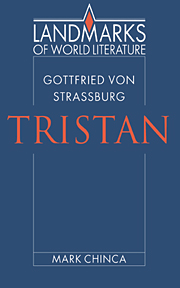5 - After Gottfried
Published online by Cambridge University Press: 05 June 2012
Summary
The love of Tristan and Isolde reaches its full potential not in the life they have lived, but in literature. It flourishes in the idyll of the grotto, which is simultaneously Gottfried's bright graceful style, and it endures in memory – the joint recollection of the lovers and, crucially, the commemoration that Gottfried posits as constitutive of the literary process. Past love is offered like a eucharist for the sustenance of noble hearts, those contemporaries of the author whose sensibility is aroused, sharpened and confirmed by the story of bittersweet passion. Thus the love of Tristan and Isolde does not grow cold, the past is remembered and renewed in the present, death becomes new life. In what, though, does this new life consist? Is it active imitation of the exemplary lovers in one's own affairs? Or is it realized in the contemplative self-immersion of noble hearts in the fictional structures of the literary text? The drift of Gottfried's great macrostructural commentaries runs in the latter direction, toward a renewal of love in the imagination, not in practice. This bold conception of the fictive potential of literature, and its articulation by means of stupendous metaphors, make Tristan a landmark in world literature.
Gottfried himself staked a claim to the title of landmark, not in world literature, of course, but in the German literature of his day. In his literary excursus he insinuates his status as laureate in the flourishing tradition of German poetry.
- Type
- Chapter
- Information
- Gottfried von Strassburg: Tristan , pp. 104 - 114Publisher: Cambridge University PressPrint publication year: 1997



